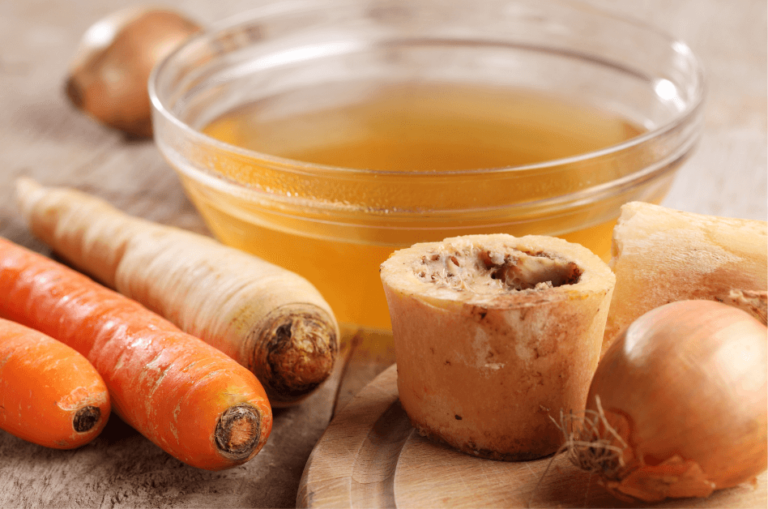
Good nutrition during cancer treatment is important, but it can be tough to eat a healthy diet of foods that taste good and don’t aggravate side effects you might be experiencing from treatment. Enter bone broth. You might have heard of it, but may be wondering: is bone broth good for cancer patients? Below I’ll share the secrets of bone broth with you, and the ways it might help you.
What Is Bone Broth?
Bone broth has been a staple in traditional diets for centuries. It’s a liquid made by simmering animal bones for a long time. The result is a nourishing liquid that contains important nutrients with many health benefits.
Bone broth is made from a variety of bones, such as beef, chicken, fish, and even wild game. These bones are slow-cooked with water and an acid, like apple cider vinegar, to pull all the nutrients from the bone marrow and connective tissue into the liquid.
Broth can be made from a single animal, such as chicken bones and chicken feet, or bones from different animals can be combined for a richer flavor. The flavor of the bone broth is really dependent on the types of animals and parts of the animals that are used.
Bone broth is made even more flavorful by adding herbs and vegetables such as bay leaves, garlic, black pepper, and onion. These ingredients also contribute their own health properties.
Garlic, for example, has known anti-inflammatory effects, while onions offer antioxidant benefits. Bay leaves and black pepper, on the other hand, may help with digestion.
Why Consider Bone Broth?
As you move through cancer treatment, you may experience some bothersome side effects. Loss of appetite or sense of taste or having nausea can make eating a chore. But bone broth is easy to consume, can be made as plain or as flavorful as you’d like, soothes a dry mouth and is gentle on the stomach.
If you’re struggling with unwanted weight loss or a loss of muscle mass, the high protein content in bone broth can be helpful. Bone broth can replenish fluids and electrolytes that are lost through vomiting and diarrhea. It can also improve digestive health, which may help ease diarrhea or constipation.
Bone broth can help ease a number of treatment side effects, but what makes it such a nutritious broth?
Bone Broth Nutrients and How They Can Help People with Cancer
Bone broth is rich in a number of nutrients including;
- Protein helps to repair damaged cells and build and mantain muscle
- Amino acids – proline, arginine, glutamine, and cysteine among others can help in rebuilding weakened muscle and tissue
- Collagen turns into gelatin during cooking, providing the building blocks for gut health and skin elasticity, which can be compromised by cancer treatment
- Minerals including calcium, magnesium, and phosphorus in bone broth contribute to maintaining strong bones and overall healthy cell function.
- Chondroitin sulfate and glucosamine have anti-inflammatory properties and may help relieve the joint pain and inflammation that patients often experience.
Some of my clients have even stopped taking collagen supplements and glucosamine and chondroitin dietary supplements after adding bone broth into their healthy eating plans because their stiffness and joint pain was relieved to the point where they didn’t need any extra supplements.
Bone Broth and Immune Support
Bone broth can help protect and boost the immune systems of people with cancer. A strong immune system is critical to fight off infections and stay as healthy as possible during treatment. The essential minerals and amino acids found in bone broth can help support healthy immune system function.
Gut Health and Nutrient Absorption
Collagen found in bone broth can protect the gut lining. This can help the body by potentially reducing inflammation and allowing the digestion system to work at its best.
A well-functioning digestive tract is key for nutrient absorption, which is even more important when undergoing cancer treatment. Your body needs to be able to absorb as many nutrients as possible to keep your energy levels and health up.
Comfort and Hydration During Cancer Treatment and Recovery
Dehydration is a common side effect for those undergoing conventional cancer treatments. Staying hydrated improves kidney function, helps to manage other side effects of treatments, and can help in preventing hospitalizations due to dehydration.
While water is the most common hydrating liquid, bone broth is a nourishing alternative with additional benefits. It is not only rich in electrolytes which can help maintain fluid balance but also provides a warm and soothing experience that can ease the mind and body during challenging times.
Think about chicken soup: it’s a food source with high water content that we often turn to when feeling sick. I don’t think it’s just because it tastes good, but because it’s an easy way to consume extra fluids, and the warm liquid provides a level of comfort when we’re not feeling well.
Bone broth’s easily digestible form makes it an excellent option for those who might find it hard to keep other foods down. Its savory taste can also stir up an appetite in patients who may otherwise feel indifferent towards eating. Bone broth can simultaneously offer comfort and essential hydration for cancer patients.
Preparing Bone Broth
Bone broth can be made fairly easily at home. Making homemade bone broth starts with selecting quality bones; beef, lamb and chicken work well. Fish bones can also be used, but they cannot be roasted nor cooked for very long.
Look for bones rich in marrow, and consider adding joints for collagen. The most important thing if they’re available is to use bones of organic, pasture-raised, grass-fed animals or wild game so they don’t have all of the antibiotics that most traditionally-raised animals will have.
One of the easiest ways to make bone broth is to cook a whole chicken in a crockpot. Once cooked, remove the meat from the bones and use that in a meal. Keep the bones and follow the instructions to make bone broth. If you can’t make the broth right away, you can freeze the bones and use them later.
1. For the richest flavor, roast the bones first. Beef bones especially have an improved flavor if roasted. Place the bones on a baking sheet and roast at 400°F for 30 minutes, until the bones are nicely browned.
2. Place the bones into a large pot or a slow cooker. Pour enough filtered water to cover the bones and add a splash of apple cider vinegar—this helps pull out the nutrients from the bones.
3. Add flavor and extra nutrition by tossing in organic vegetables like carrots, celery, garlic and onions. Some people include eggshells for the added bonus of extra minerals. I haven’t tried using eggshells in my own bone broth, but I plan on using them the next time I make my own broth, and see if it changes the taste.
4. Herbs and spices can also be added to the broth to change up the flavor and even provide additional health benefits. Black pepper, turmeric, and ginger are some you could try to improve digestion. Experiment with flavors you like best.
5. Set the heat to low and let the mixture simmer gently. For chicken bones, cook for 24 hours at most and cook beef or lamb bones up to 48 hours.
6. Skim off any foam that forms on the surface. Once done, strain broth through a fine-mesh sieve to remove any solids.
7. Let the broth cool before storing it in the fridge or freezer. Once fully cooled, a layer of fat will rest on top of the broth. This can be skimmed off if you’d like. When the broth is heated, it will liquefy again, and can be a form of healthy fat to incorporate into your diet.
If making bone broth is not an option, head to the grocery store to find pre-packaged bone broth.
Check the label to see that organic ingredients have been used and that the broth is free from additives. some grocery stores sell bone broth in powder form.
Bone broth powder is easier to take with you if you’re traveling. It’s also super convenient for your caregiver. If they want the benefits of bone broth, they can take the powder with them while keeping you company during treatment or if you’re in the hospital. They’ll simply put a scoop in a cup and add hot water and stir to dissolve.
Incorporating Bone Broth Into Your Diet
Integrating bone broth into your diet can be super simple. Start with small servings, such as a cup a day for up to 3 days per week, to see how your body reacts to the broth.
Steadily increase the amount over time, depending on your personal tolerance and the advice of your healthcare provider. Listen to your body; if you find it beneficial, consider having bone broth several times a week, or reducing the amount and including it as part of your daily routine.
Broth can be drunk warm or at room temperature. Room temp liquid can be a great option if you have a sore mouth or throat from treatment. It can be sipped like tea or used as a base in other recipes like soups and stews. You can even use bone broth to cook vegetables or legumes.
Be sure that bone broth is just one part of a balanced diet that promotes good health and healing from cancer treatment.
Conclusion
Here I’ve reviewed the nutritious qualities of bone broth and how it may help improve the healing process for cancer patients. Bone broth is packed with nutrients like amino acids, collagen, and minerals that could assist in boosting your immune system, promoting gut health, and improving hydration and nutrient absorption.
Talk with your doctor about bone broth to see how it might fit into your dietary plan, and maybe soon you’ll be experiencing the benefits of bone broth.
Medical disclaimer: The content on My Cancer Resources is provided for informational and educational purposes only, and is not intended as medical advice, or as a substitute for the medical advice, diagnosis or treatment by a physician or other health care practitioner.



